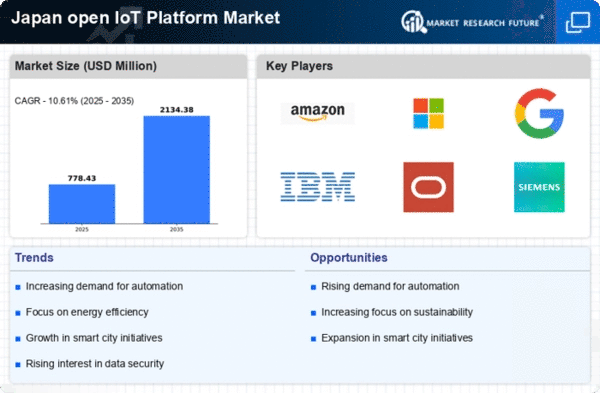Advancements in 5G Technology
The rollout of 5G technology in Japan is poised to revolutionize the Open IoT Platform Market by providing faster and more reliable connectivity. With 5G networks expected to cover 90% of the population by 2025, the potential for real-time data transmission and enhanced device interconnectivity becomes a reality. This advancement facilitates the deployment of more sophisticated IoT applications, such as autonomous vehicles and smart healthcare solutions. The open iot-platform market stands to gain from this technological leap, as businesses leverage 5G capabilities to improve operational efficiency and customer experiences. The integration of 5G with open IoT platforms may lead to innovative use cases that were previously unattainable, thereby driving market growth.
Rising Demand for Smart Cities
The Open IoT Platform Market in Japan is experiencing a notable surge in demand driven by the government's commitment to developing smart cities. This initiative aims to enhance urban living through the integration of IoT technologies, which facilitate efficient resource management and improved public services. As of 2025, the Japanese government has allocated approximately $1 billion towards smart city projects, indicating a robust investment in infrastructure that supports open IoT platforms. The focus on sustainability and energy efficiency further propels this market, as cities seek to reduce their carbon footprint. Consequently, the open iot-platform market is likely to benefit from increased collaboration between public and private sectors, fostering innovation and creating new business opportunities.
Increased Focus on Sustainability
Sustainability has emerged as a critical driver for the Open IoT Platform Market in Japan, as both consumers and businesses prioritize eco-friendly practices. The Japanese government has set ambitious targets for reducing greenhouse gas emissions, aiming for a 46% reduction by 2030. This commitment encourages the adoption of IoT technologies that promote energy efficiency and resource conservation. Open IoT platforms play a vital role in enabling smart energy management systems, waste reduction initiatives, and sustainable supply chain practices. As organizations seek to align with these sustainability goals, the open iot-platform market is likely to witness increased investment and innovation, fostering a more environmentally conscious approach to technology.
Government Initiatives and Support
Government initiatives in Japan are playing a pivotal role in shaping the Open IoT Platform Market. Various policies and funding programs have been established to encourage the development and adoption of IoT technologies across multiple sectors. For instance, the Ministry of Internal Affairs and Communications has launched initiatives aimed at fostering innovation and collaboration among startups and established companies. This support is crucial for creating a conducive environment for the open iot-platform market to flourish. Additionally, the government is actively promoting public-private partnerships to accelerate the deployment of IoT solutions, which could lead to enhanced competitiveness and economic growth. As these initiatives continue to evolve, they are likely to provide a strong foundation for the future of the open iot-platform market.
Growth of Industrial IoT Applications
The Open IoT Platform Market is significantly influenced by the expansion of industrial IoT applications across various sectors in Japan. Industries such as manufacturing, logistics, and agriculture are increasingly adopting IoT solutions to enhance operational efficiency and reduce costs. Reports suggest that the industrial IoT sector in Japan is projected to grow at a CAGR of 15% from 2025 to 2030, highlighting the potential for open IoT platforms to facilitate seamless connectivity and data exchange. This growth is further supported by the need for real-time monitoring and predictive maintenance, which are essential for optimizing production processes. As industries embrace digital transformation, the open iot-platform market is poised to thrive, driven by the demand for innovative solutions.

















